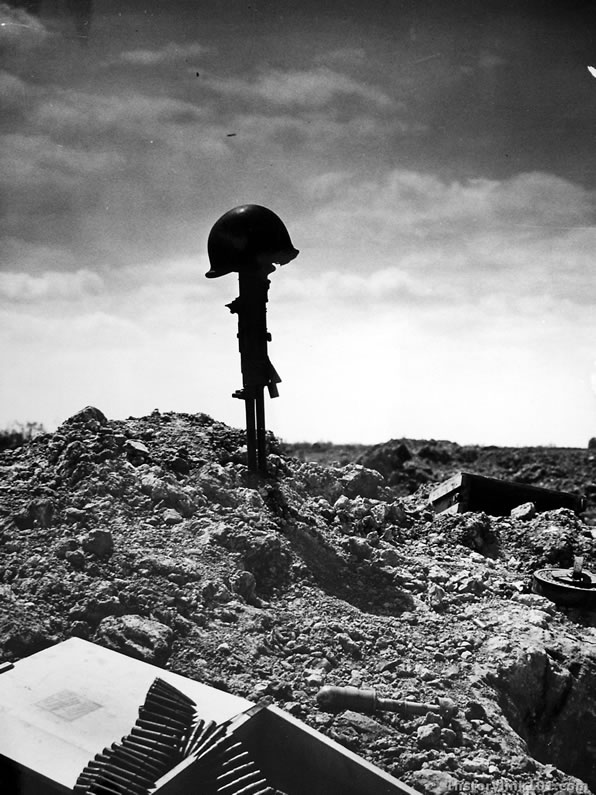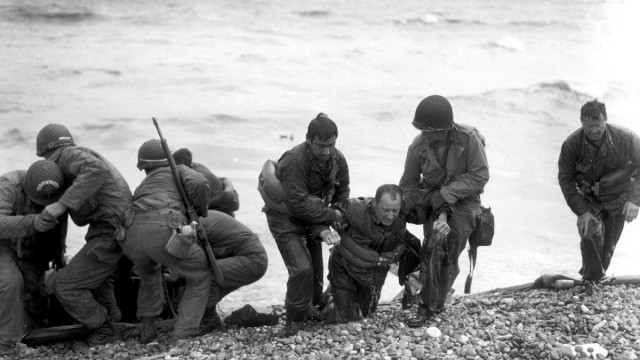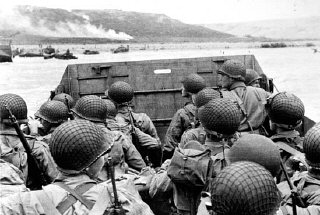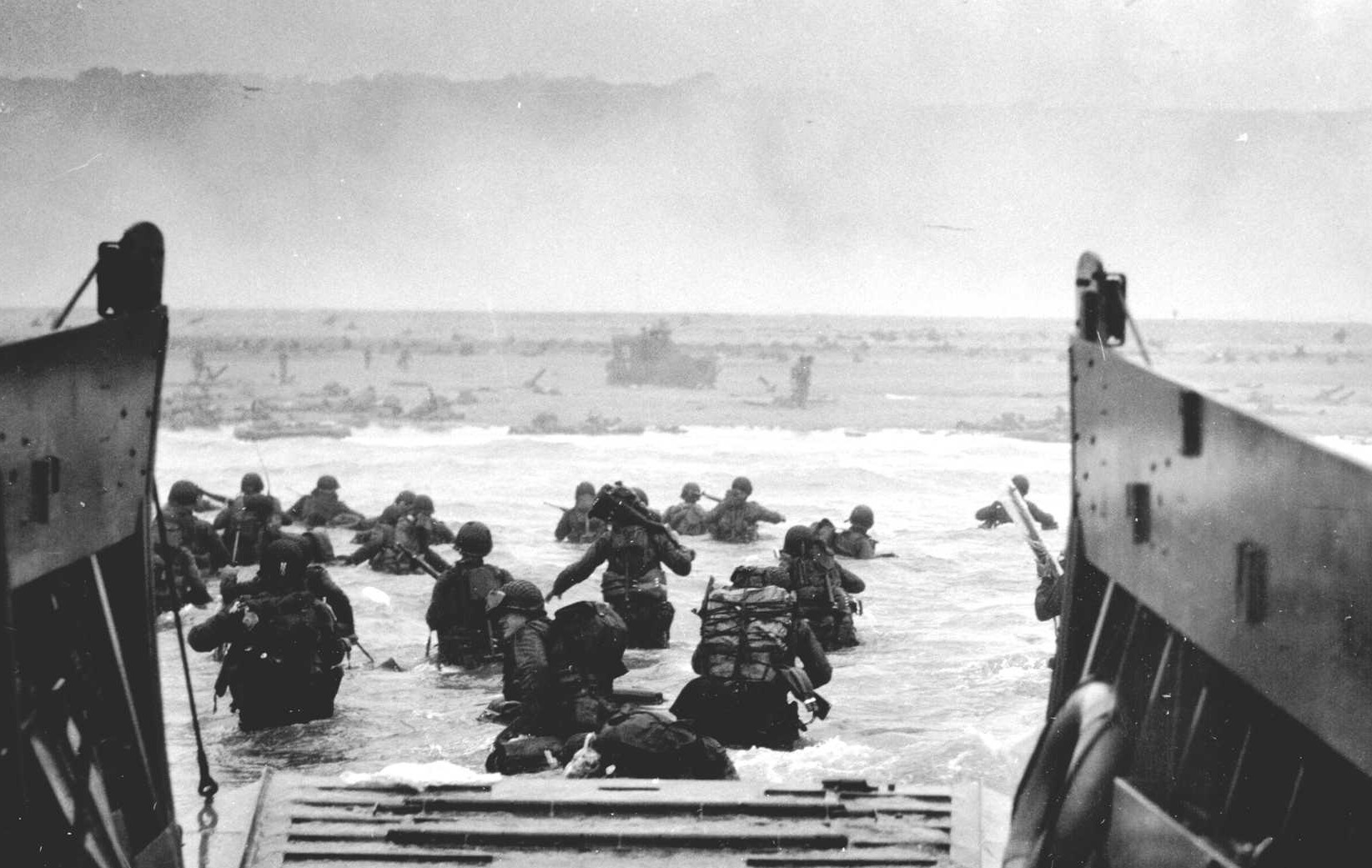One wonders if, 30 years from now on the 100th anniversary of D-Day, America and Europe will still be commemorating the landing in the same schlocky, sentimental way. The post World War II order has crumbled around us; isn’t it about time to reexamine its obsolete premises? Indeed, isn’t it about time we questioned nationalism itself?
 The shadow of man’s vicious past stretches into the new millennium. A morally and spiritually bankrupt West retreats further and further into nostalgia and hollow displays of patriotism. The old, but obviously not over Cold War heats up. Yet President Obama proclaims nonsense: “Our victory in World War II decided not just a century, but shaped the security and well-being of all posterity.” Does he really believe such tripe? Does anyone any longer?
The shadow of man’s vicious past stretches into the new millennium. A morally and spiritually bankrupt West retreats further and further into nostalgia and hollow displays of patriotism. The old, but obviously not over Cold War heats up. Yet President Obama proclaims nonsense: “Our victory in World War II decided not just a century, but shaped the security and well-being of all posterity.” Does he really believe such tripe? Does anyone any longer?
A friend’s father was a Marine who fought on Tarawa in the Pacific during World War II, where the United States suffered the highest casualty rates of any battle in American history for a strategically unnecessary scrap of land. Later he watched as mothers, clutching their babies, jumped to their deaths from the cliffs of Saipan, brainwashed and terrified of what the American soldiers were going to do to them.
He was also among the first contingent of American troops into Nagasaki after the atom bomb that ended the war with Japan, where tens of thousands of lives were instantly snuffed out in a flash of benighted light. Not long before his death he spoke to me at length for the first time about his experiences. There was none of the gilded heroism and sickly patriotism one finds in Obama’s D-Day speech, just emotionally charged flashes of memory conveying the raw horror and the soul-numbing terror of war, the sight and smell of bloodshed on both sides, and of the immense relief at the war’s end and the gratitude for his survival.
That is the true face of war; but it found no expression in Obama’s schmaltzy D-Day speech. There are many ways to lie, but praising the virtues of sacrifice in long-ago wars, without speaking to the senselessness of death and suffering in man’s wars, is amongst the worst of them.
President Obama’s cynical manipulation of the symbols of nationhood and war without any insight into war, and the responsibility of nation-states to learn from the past in our de facto global society, cut the last sinews of respect I had for the man.
Obama had just come off a week in which he badly miscalculated the barter of Bowe Bergdahl, held captive for five years in Afghanistan by the Taliban, for five ‘enemy combatants’ in the trumped up ‘global war on terror.’ Bergdahl, who has been labeled a deserter, has become a lightning rod in the resurgence and regurgence of American patriotism. Few know that there were 50,000 American deserters in the European Theatre alone during World War II. I didn’t.
for five years in Afghanistan by the Taliban, for five ‘enemy combatants’ in the trumped up ‘global war on terror.’ Bergdahl, who has been labeled a deserter, has become a lightning rod in the resurgence and regurgence of American patriotism. Few know that there were 50,000 American deserters in the European Theatre alone during World War II. I didn’t.
Before he left for Europe, Obama trumpeted a “we don’t leave men and women in uniform behind” trope. He probably hoped his rhetorical floridness on the D-Day anniversary would make everyone forget the Bergdahl ballyhoo. But his speech was forgotten before he finished delivering it.
It isn’t Obama’s fault; the American people have perished, and America can no longer lead. What is going to fill the vacuum? China? Even if it wanted to, which it doesn’t, the notion is preposterous coming on the heels of the 25th anniversary of the unaddressed massacre on Tiananmen Square.
The size and power of countries no longer matter, and leadership could come from anywhere, even a tiny country like Costa Rica. Indeed, leadership is no longer in terms of countries at all. Could it come from interconnected global citizens, who have yet to see their power?
As history attests again and again, if forward-looking people with a depth of spiritual values and a breadth of humanistic vision do not step into the vacuum opened up by the collapse of a world order, backward-looking rightists with false promises of restoring old glory will suck everyone into a maelstrom.
The D-Day celebrations this year were probably the last gasp of Victory in Europe mythology. (People don’t realize that Stalin, who was as evil as Hitler, had to twist Churchill’s and Roosevelt’s arms in Yalta to open an eastern front.) In France, where the landings took place, right-wing extremists are ascendant. Ominously, the ‘earthquake’ of the National Front’s Marine Le Pen promises to “give the French people back their country their freedom, their fortunes and their pride.”
 Again, the absence of a progressive vision in the global society plays into the hands of retrogressives in America and Europe and everywhere. Empty rhetoric, manipulatively tied to the past and mendaciously disconnected from the present, belies the vacuum of leadership in the world, which hard-core nationalists are all too willing to fill, to the danger of their nations and to the detriment of humankind as a whole.
Again, the absence of a progressive vision in the global society plays into the hands of retrogressives in America and Europe and everywhere. Empty rhetoric, manipulatively tied to the past and mendaciously disconnected from the present, belies the vacuum of leadership in the world, which hard-core nationalists are all too willing to fill, to the danger of their nations and to the detriment of humankind as a whole.
The question is: Are displays of patriotism necessary for the health of a country, or have they become toxic in the bloodstream of both nations and humanity? What does ‘national defense’ mean in a global society, where all war has become internecine conflict?
The old notions that ‘we are members of one national community,’ and ‘national cohesion is essential to national survival’ are not simply archaic in a global society, or absurd in a nation that has fragmented into 300 million individualistic units; they have become radioactive, destructive to any true sense of cohesion and community for humanity.
Patriotism once had its place, but it has degenerated into meaningless, flag-waving nationalism, which is inherently separatist. A top official of the ‘Donetsk People’s Republic’ in eastern Ukraine, Fyodor Berezin, mocks nationalists everywhere when he says, “As long as Ukrainian troops are on our soil, the fight will continue.”
Emotionally perceiving oneself as first belonging to the human community does not exclude devotion to one’s people and country; but seeing oneself first as an American, Donetskian, or anything else is inherently separative in the global society, and has become inimical to the human prospect.
The nation-state as sovereign belongs where it has fallen—onto the ash heap of history. Before we enshrine countless more ‘fallen,’ look to humanity, and love humanity before country. Only that now can breathe life into one’s people and nation.
Martin LeFevre

